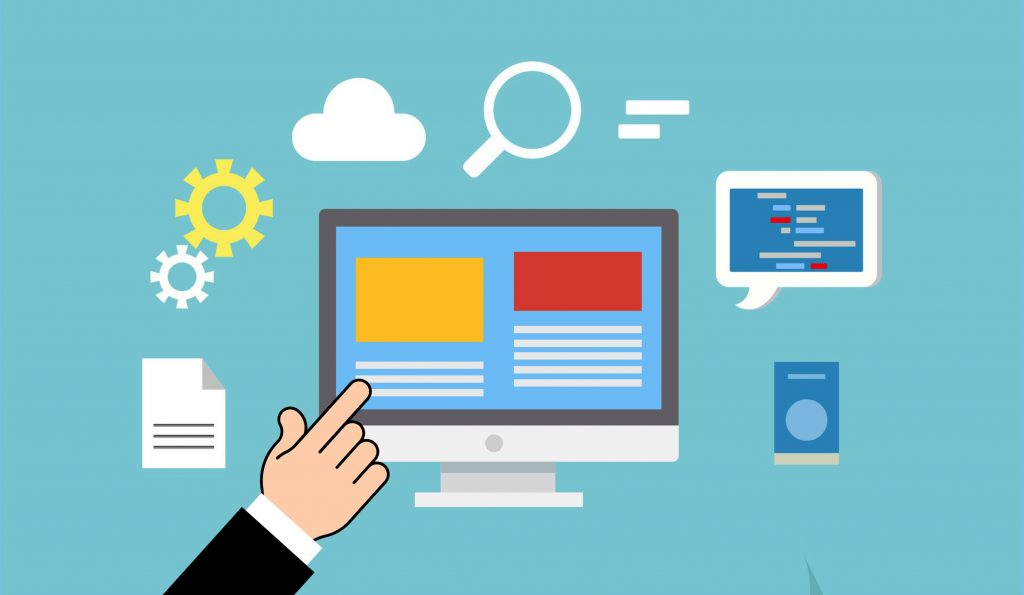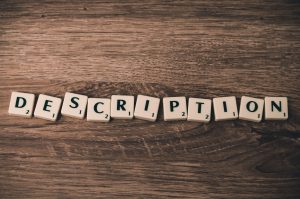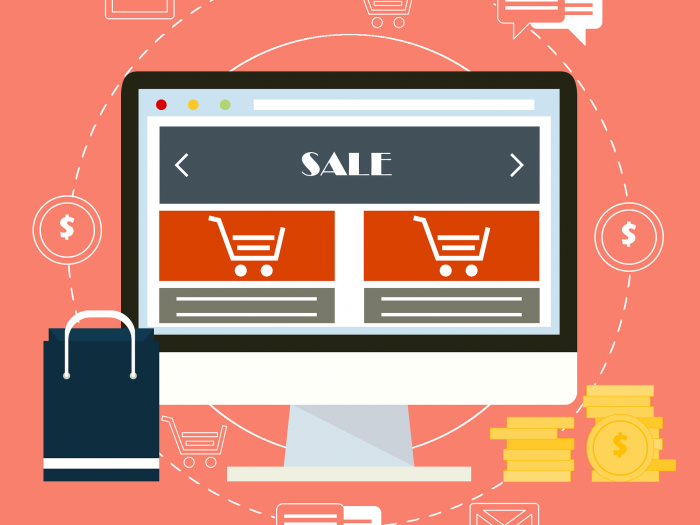 ECommerce is an abbreviation for the term Electronic Commerce. By ECommerce, we mean a digital platform where individuals perform the purchase, sell and exchange of various products and services. It is a rapid-paced developing solution liked by most persons in today’s internet or electronic era. All the individuals want to enjoy the comfort and relaxation but also performing various actions by sitting at their place, and ECommerce is the best solution. Nowadays, many ECommerce Platforms, like BigCommerce, Shopify, WooCommerce, Magento, etc., assist online visitors’ needs.
ECommerce is an abbreviation for the term Electronic Commerce. By ECommerce, we mean a digital platform where individuals perform the purchase, sell and exchange of various products and services. It is a rapid-paced developing solution liked by most persons in today’s internet or electronic era. All the individuals want to enjoy the comfort and relaxation but also performing various actions by sitting at their place, and ECommerce is the best solution. Nowadays, many ECommerce Platforms, like BigCommerce, Shopify, WooCommerce, Magento, etc., assist online visitors’ needs.
On-Page SEO is the system required for optimizing web pages for the website’s higher position at different Search Engine Result Pages (SERPs) of multiple search engines. It refers to optimizing both the content and the HTML code of the webpage. It extends to other things like meta tags and markup schema. Flawless user experience, technical excellence, and excellent content are the essentials of On-Page SEO.
On-Page SEO for ECommerce means a modern SEO strategy to improve the ranking, engage users, drive more traffic, and increase ECommerce websites’ leads. It helps online visitors to search the website conveniently for the product they are searching for accomplishing their needs.
The following is the list of On-Page SEO concepts to win valuable web traffic for ECommerce website:
- Excellent content for the website
- Keyword research and optimization
- Meta title and descriptions
- Header tags
- Snippets
- Content audit
- Images and video optimization
- User experience
- Navigation
- FAQ/About Us/Contact Us pages
- Site search, etc.
8 IMPORTANT ON-PAGE SEO TIPS FOR ECOMMERCE
On-Page SEO for ECommerce is the foundation of ECommerce website ranking. On-Page SEO is a vital element for the website’s position, and it offers more significant assistance to attract more web traffic and leads for the website. The professional SEO experts follow the below-listed tips to enhance the performance of an ECommerce website:
CREATE AND PUBLISH HIGH-QUALITY CONTENT
High-quality content is the source of attraction for users and one of the most crucial aspects to get a higher ranking of the website on the search engine. Good or high-quality content has the following unique features:
ORIGINALITY: The content should be original and should not include any copies, rewrites, or duplication of existing articles. It should be unique and attractive to fetch more web traffic.
EXCLUSIVITY: It should be of high-quality and must follow the exclusive features of SEO while generating the content. The content with freshness and new things positively affects the online searcher’s search.
VALUABLE: The content formed or published on your website must offer the clients value for their convenient search experience. Publish only that content that will be useful for online visitors and accomplish their needs.
WELL-RESEARCHED: The content should be published only after conducting a quality check of information. The online searchers prefer long text over short stories while searching your website for their need accomplishment.
UNBIASED: If you are publishing a public post or answering the clients’ queries on your website, make sure you give justified content for the sake of both parties.
SATISFY SEARCH INTENT: Make sure that your content should satisfy the online visitor’s search intent. Ensure the search expectations of the users before publishing content for your website.
The high-quality published content helps satisfy the client’s needs and fetch more web traffic. It positively impacts the ranking of the ECommerce website on different search engines.
PAGE TITLE AND META DESCRIPTIONS OPTIMIZATION
The page title and meta descriptions are one of the significant elements of On-Page SEO for ECommerce. These elements specifically focus on the services and areas in which the business concentrates. It must be eye-catching and informative enough so that the searcher feels tempted to know about your website and helps search engines to rank your website.
PAGE TITLE OPTIMIZATION TIPS:
The following is the list of recommendations you must follow while performing Page Title Optimization for your website:
- Write Short and Descriptive Titles: A page title should not exceed its length, and it must be concise and descriptive. The general recommendations for title length are to keep it below 70 Characters as Google thinks it is the average amount to display headlines in searches.
- Include Keywords at The Beginning Of Your Page Titles: If it is possible, add your targeted keyword to the starting of your title. It’s not compulsory to add in the beginning but make sure that your keyword will be a part of your title.
- Add Power Words or Numbers: Power words like actionable, unique, compelling, ultimate, etc., and numbers in the page title makes the title more attractive and increases Click Through Rate.
META DESCRIPTIONS OPTIMIZATION TIPS
 The following are the recommended tips for a successful meta description optimization:
The following are the recommended tips for a successful meta description optimization:
- Avoid Auto-Generated Descriptions: You must avoid auto-generated stories as sometimes, It does not prove sensible or understandable to the online visitor. Include your targeted keyword in the meta description: You must include the targeted keyword in your meta descriptions to make it more relevant and appealing to the visitor.
CONTENT OPTIMIZATION
Content Optimization plays a vital role in ensuring more visibility and readability and getting a higher conversion rate. A well-optimized content helps you to make a leading identity of your business on the digital ECommerce platform. It boosts the company’s revenue and sales and took the business website to the new heights of Search Engine Result Pages. Do not compromise for content relevancy, uniqueness, and reader engagement. Optimized content can give your webpage a leg up in search engine rankings. You must ensure the following tips while performing content optimization for the website:
- Unique Product Descriptions and Titles: It helps make your website look professional and explain the product or website. You have to take care of the content’s length, figure out what makes your product unique, and your brand’s tone of voice clarity.
- Personalization: The personalization of the content improves the user experience with an ECommerce website. Customer data will help you find out the client’s search behavior.
- Add User-Generated Content: User-generated content helps in making a buying decision by the potential clients. You must respond to the customer’s reviews to enhance web traffic and more leads for the business.
Content is the future of any ECommerce website as it offers descriptive knowledge and information to the clients about your business. ECommerce content optimization has immense benefits to compete with harsh competition.
IMAGES AND OTHER MULTIMEDIA OPTIMIZATION
Image or other multimedia optimization is one of the crucial sections of On-Page SEO for ECommerce. The appropriate placement of pictures or other media on the website helps to get higher rankings. Images are the best for the representation and make the page more exciting and easier to understand.
Following are the best steps to perform relevant image optimization:
- Name Your Images Descriptively and in Simple Language: It is essential to use the relevant name in simple language when performing SEO image optimization. It is the best technique to crawl your website and image file name.
- Optimize your alt attributes carefully: Alt attribute optimization adds value to your website. It is used for more web accessibility and helps to rank your website higher on the search engine.
- Wisely Select your image dimensions and product angles: It is best to display your images with multiple tips to enhance the user experience. If you work for this, Google will reward you with a higher ranking.
- Reduce your image’s file size: Larger the file size, the longer the time it will take to load. Usually, the users will wait for 3 to 4 seconds, and if your image takes more time to load, they will shift to another site. So select the file size properly.
URL OPTIMIZATION
Uniform Resource Locator or URL helps search engines contextualize the purpose behind the web page’s generation. The standard optimization of URLs helps in getting a higher ranking of the website. By URL, we mean it is an electronic address to find a website on a digital platform. URL is the business’s digital address that helps the clients get complete information about your business, products, and services. It assists a client to navigate a website to meet the needs of various products and services.
The below-listed are some of the specific features of URL:
- Simple and consistent: The URL must be consistent and straightforward, and relevant to your website. Also, keep it short of making it memorable for the client. It enhances the user experience, instills trust, and optimizes for sharing.
- Organized: Organized URL is a widely accepted essential element of SEO for an ECommerce website. Categories, directories, subfolders are much better to use to make an absolute URL.
- Trustworthy: The trustworthiness of the URL plays an essential role in successful SEO for ECommerce. It will help you to build site credibility and improve the rank of the website.
BUYER INTENT KEYWORDS INTEGRATION
The product-oriented keywords are the relevant source of attraction to get more web traffic to the ECommerce website. Buyer intent keywords are those which indicate that a visitor is actively looking to purchase something. For the success of On-Page SEO, product pages must include buyer intent keywords in the:
- Title page
- Meta descriptions
- Product descriptions
It will help the clients get the most relevant information about the product they are searching for and accomplish his/her needs. We can estimate the buyer intent keywords with the help of the following three keyword categories:
- Navigational Keywords: These keywords include brand names signal navigational intent, which means a proper pathway for the searcher to know what he is looking to buy.
- Informational Keywords: Informational keywords mean that the searcher is willing to search more for the concept. It helps to get queries from the customers to enhance the performance of the website.
- Commercial Keywords: Commercial keywords show a firm intention of the searcher to perform an act. The searcher considers buying the deals, coupons, free shipping, purchase process, etc.
WEBSITE SPEED
The websites with high site loading speed help drive more web traffic, leads, conversion rate, and enhance your website’s rank at various search engines. It is beneficial to dedicate time and resources to achieve the fastest possible page loading speed. The below-listed techniques are essential to speed up your ECommerce website:
- Frequently run a quality performance analysis to investigate poor performance
- The business owners have to upgrade or change hosting when required.
- Use Content Delivery Network to reach more clients globally
- Limit your page size to enhance the user experience
- Delete unnecessary HTTP request that hinders the website speed
- Optimize the TTFB (Time To First Byte)
- Revise third-party extensions often
- Oversee your website performance
The site loading speed is affected by various factors like the weight of a page, unoptimized pages, slow hosts, abundant server requests, buggy code, cache, etc. The SEO professional must take care of all these factors to enhance the ranking of the website. You can Check your website speed insights.
INTERNAL LINKING OPTIMIZATION
Internal links are the hyperlinks or links that point to another page or another source on the same website. It goes from one page on a sphere or webpage to the different pages on the same website or domain. It helps in the following distinctive ways:
- Permits users to navigate your website
- Establishes information hierarchy on the website
- Spreads the link equity around the website
The following are the things to consider while creating internal linking for your website:
- Audit your web pages: It will help you keep a record of your website’s overall pages, which you need to sort before proceeding to the next
- Generate an overall link structure: It is essential to distribute the links right from the beginning.
- Think about the page’s internal location: It helps clients to get adequate information about your products and services by the searcher.
- Tweak the Anchor Text: Tweak the anchor text with an innovative and specific feature to attract more visitors.
- Add some links to vital pages: It helps to keep the clients informed about the website.
- Perform the website cleaning frequently: It improves the site speed and enhances user experience.
JevinTech
JevinTech is a complete and comprehensive SEO Agency working across the USA, Canada, Australia. Our company has experts to handle the clients’ vulnerabilities regarding their electronic business needs to get higher rankings. We offer Complete SEO Solutions. Contact us on our website to know more details.




